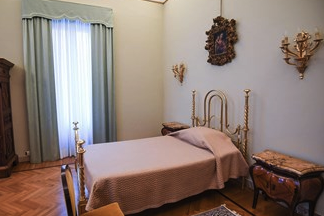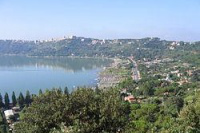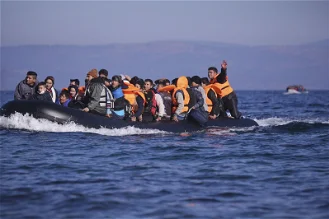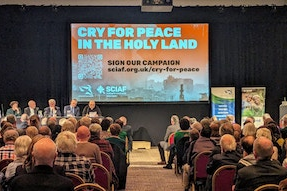Rome: Focolare hosts international ecumenical gathering
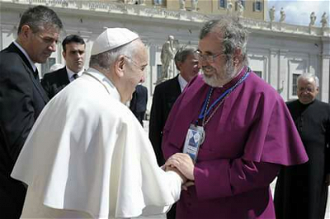
Pope Francis meets Episcopalian Bishop Mark Strange
Liz Taite reports on ‘Travelling Together’, an ecumenical gathering at the Focolare’s International Centre in Castel Gandolfo, Rome from 9 - 13 May 2017.
"I had no idea what to expect before I went, but nothing could have prepared me for the overwhelming sense of togetherness and purpose that I experienced. I felt I made new friends in Christ from all over the world." These were the words of a member of the Scottish Episcopalian Church shortly to be ordained. Along with almost seventy others from Britain, she was participating in the ‘Travelling Together’ conference coordinated by the Focolare to mark the 500th anniversary of the Lutheran Reformation and the 50th anniversary of the Focolare’s contacts with the Orthodox churches and which brought together almost seven hundred people from 69 churches and 41 countries, speaking 18 different languages. The British group was made up of members of seven churches.
The spirit of celebration and of wonder at the richness and diversity of the Christian family was evident from the outset. Each morning began with prayer from a different tradition, from a different part of the world, drawing us immediately into a universal dimension.
The programme included attending the General Audience with Pope Francis, sung Orthodox prayer in the Basilica of St Paul Outside the Walls and a guided tour of the St Sebastian Catacombs. The tour was followed by an ecumenical service in the chapel above. At one point everyone was invited to say the Lord’s Prayer in their own language. For one participant the gentle, melodic and yet strong chorus of voices made her feel as if she were ‘witnessing Pentecost’ and it ‘came as the answer to the chaos of war that we are experiencing today’.
The theme of the week was Jesus Forsaken: key to unity, which was explored through the insights of Chiara Lubich, founder of the Focolare, the sharing of personal stories and through dialogue, whether in the meeting hall, over lunch, on the bus or in the bar.
In his address, the Reverend Dr Martin Robra of the World Council of Churches reflected "Jesus forsaken is not a theological concept or doctrine: Jesus Forsaken refers to deeply disturbing and at the same time fulfilling experiences and insights." He recalled the impression meeting Chiara Lubich just a month before she left this earth had made on him:"I still see her so tender and frail and I will never forget how she turned to me with the one question that reflects the night of the cross and the new daylight of the resurrection: 'Who is Jesus forsaken for you?' – for me, for you, for all of us: communion of life in Christ today and in eternity.’ Robra went on to say that "the spirituality of unity will take shape in the dialogue of life."
Indeed, in their presentations, Bishop Brian Farrell of the Pontifical Council for Promoting Christian Unity and Bishop Gennadios Zervos, the Metropolitan Bishop of the Patriarch of Constantinople, also rejoiced in the Focolare’s charism of unity which facilitates communion among all. Bishop Zervos presented Maria Voce, President of the Focolare, with a medal depicting Patriarch Athenagoras I with Pope Paul VI on one side and Patriarch Bartholomew with Pope Francis on the other.
The day after returning home, one participant wrote to the Churches Together group in his area: "One of the strongest things I have taken away from the meeting is “the other person completes me by their diversity”. What this means is that it is in our differences that we can come together and see glimpses of the truth. We all carry around our particular prejudices and preferences but what we all need to remember, however, is that real truth belongs only to Christ…Working ecumenically makes us stronger as a church, as individual Christians and as human beings and when we work together we can and do transform society."
Another participant wrote: "I am aware of my 'suitcase' of prejudices. I have yet to set my 'suitcase'/baggage down, to allow me to go through the contents carefully in an effort to minimise the load, and also therefore to minimise the potential damage the prejudices contained therein might do, in sabotaging my best intentions."
The fervent tweeting from #TravTog included one saying: ‘Thanks for the gracious welcome I received in Rome. Somehow life won’t be the same again. Really blessed’, whilst another, posted after the concluding session said ‘Final summary: keep in touch, be one with the other and find the right note’, the God-note which allows the orchestra to play. Earlier, during a press conference, Maria Voce was asked whether she believes that unity is possible and whether it could happen in this century. She replied that she is sure that one day unity will come about because it is what God wants. Whether or not it happens in this century is not what is most important: what matters is that it happens and that we take the steps God asks of us today and work for unity by at least recognising ourselves as brothers and sisters.
Everyone certainly left Travelling Together having experienced the one family of God - keen, in the words of one participant, "to keep things moving."



